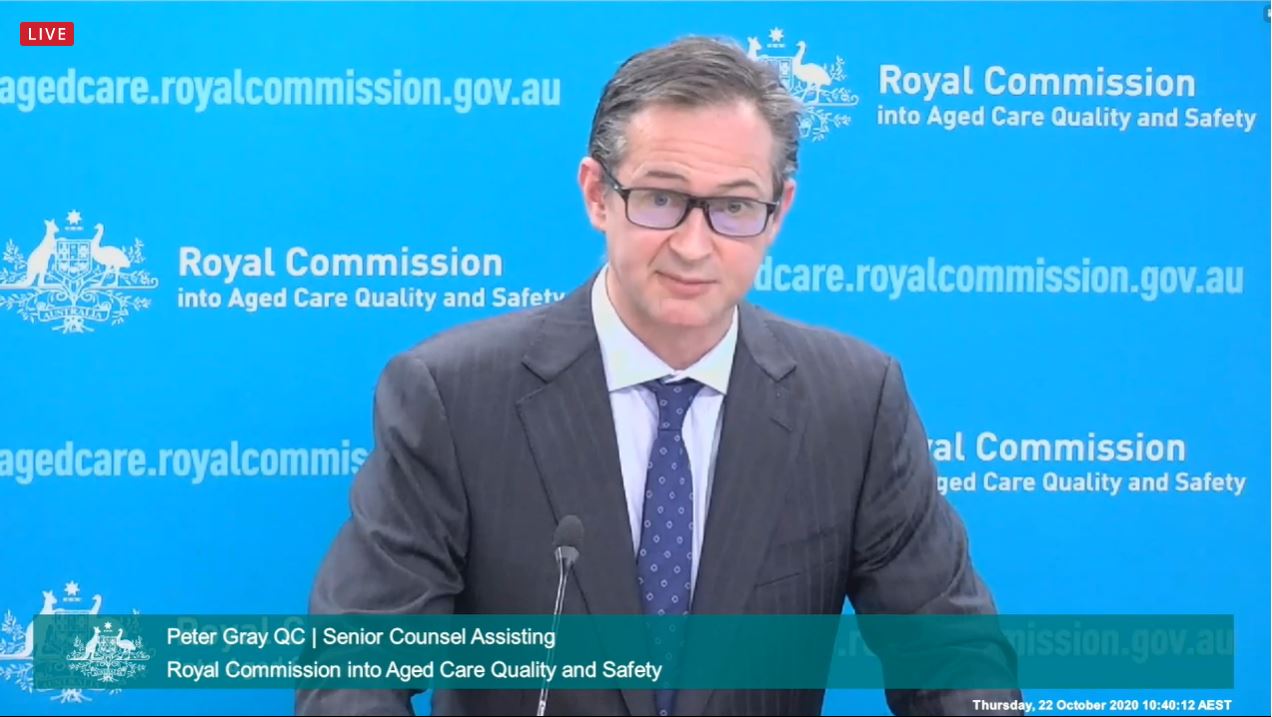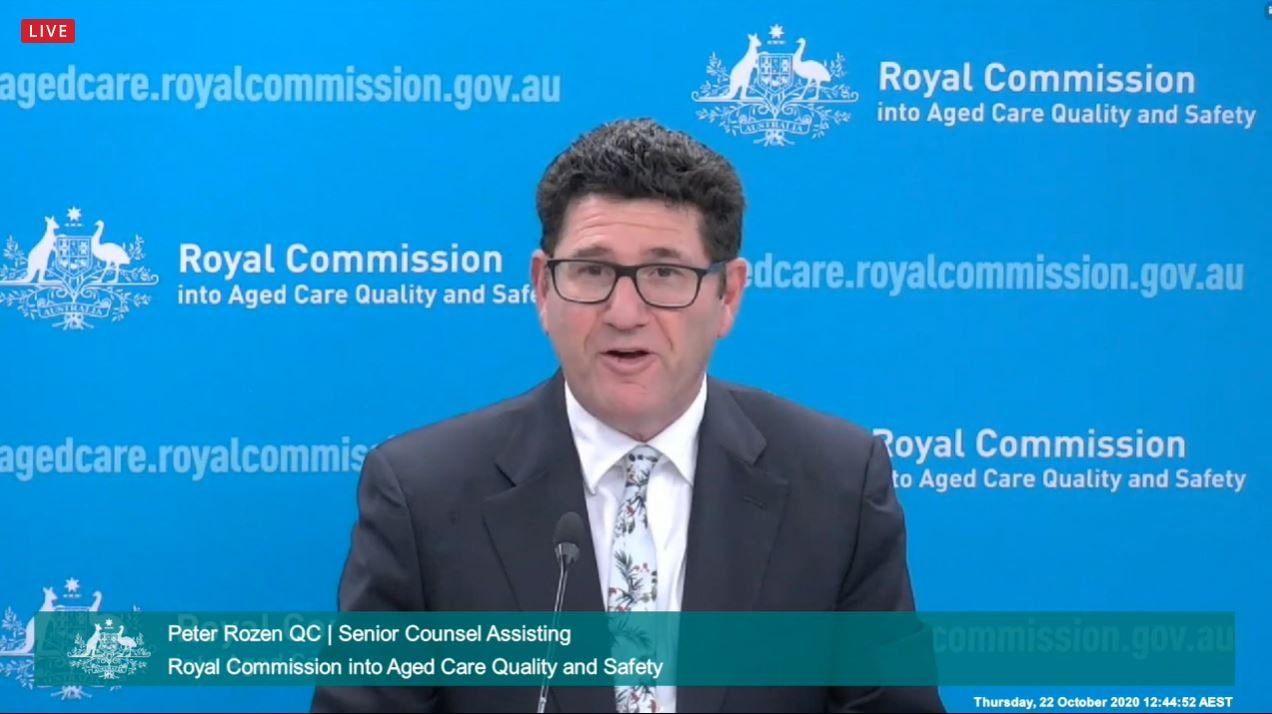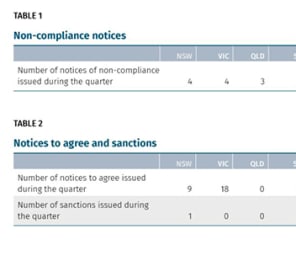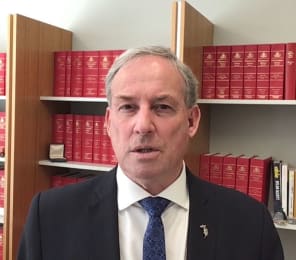The final two days of hearings of the Royal Commission into Aged Care Quality and Safety have provided the first real insight into the recommendations that Commissioners Tony Pagone QC and Lynelle Briggs AO could make in their Final Report – or not make as the first day of hearings showed.
Senior Counsels Assisting Peter Gray QC and Peter Rozen QC said it was clear that high-quality aged care was not being delivered at the systemic level by the sector and outlined a number of key initiatives from the 124 recommendations contained in their 85-page list of recommendations, including:
- A new Aged Care Act based on human rights principles;
- A new planning program for aged care which provides demand-driven access in place of the current rationed approach;
- A new and independent process for setting aged care Quality Standards;
- A new enforceable general duty of care on approved providers of aged care with penalties for failing to meet requirements;
- Mandated staffing ratios in residential aged care;
- Compulsory registration of personal care workers;
- An independent pricing authority that will determine aged care prices matched to services; and
- An independent Aged Care Commission that will be responsible for administering and regulating the aged care system.
Drawing on their 475 pages of submissions, the Senior Counsel took turns to highlight a number of areas including the design of the new aged care system; quality and safety; workforce; and governance.
 Aged care system should take human rights-based approach
Aged care system should take human rights-based approach
In particular, the pair argued for a new human-rights based approach to aged care with the older person at the centre – an idea backed by Commissioner Briggs who stated it was vital for the system to “put people first” as well as be equitable, effective and accountable.
Noting that past Governments have failed to take a proactive role in steering the sector, Mr Gray said it was clear that the Government needed to be more hands on without taking a “command and control approach”.
Commissioner Briggs argues against taking away responsibility for sector from Government
To achieve this, the Counsel argued the regulation of the sector should be turned over to a new independent Aged Care Commission – but Commissioner Briggs had issues with this proposal, saying it would lead to a “massive churn” of experienced people at a time when other reforms would “required focused and sustained leadership from the Government”.
While the Commissioner didn’t defend the Department of Health – saying that it had obviously been too slow in pursuing reforms – she argued that ‘beefing up’ the Department to create a new Department of Health and Ageing could be a more viable option.
Commissioner Pagone however stated that his view was more “aligned” with the Counsel Assisting – an issue the Commissioners will need to resolve then before they hand in their Final Report to the Government.
There was also division between the Senior Counsel and Commissioner Briggs on improvements to the home care program with the Commissioner pointing to the urgent requirement to determine the unmet need for CHSP services as a priority and also the importance of providing access to allied health services to those receiving home care.
Providers to have a duty of care – including online aged care worker platforms
On the issue of quality and safety, the Senior Counsel stood by their earlier workforce recommendations from February this year including minimum mandatory staffing levels in residential care.
 Mr Rozen also put forward a recommendation for not only approved providers to have a duty of care to those under their care, but for also for online worker platforms such as Mable to have a duty of care to ensure carers that use their platforms have the right skills and qualifications for the duties that they are carrying out.
Mr Rozen also put forward a recommendation for not only approved providers to have a duty of care to those under their care, but for also for online worker platforms such as Mable to have a duty of care to ensure carers that use their platforms have the right skills and qualifications for the duties that they are carrying out.
Under these changes, responsibility for setting aged care standards would also be transferred to the Australian Commission on Quality and Safety in Healthcare which would be renamed to include aged care.
Commissioner Briggs outlines measures to crack down on restraints
Providers found to have used physical and chemical restraints without need would also be subject to civil penalties with a review of the lawfulness of the conduct open to the resident.
But again, Commissioner Briggs suggested that these measures were not enough to ensure safe and high-quality care – pointing to the need for additional steps including a requirement to only use restraints where there is an emergency and a need to prevent harm; making their unauthorised use a reportable incident and ensuring directors are personally liable with possible compensation options available to residents.
Stay tuned for the second part of the Counsel Assisting’s recommendations in tomorrow’s issue.










